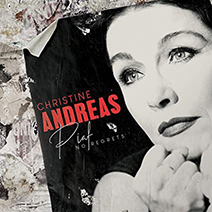Christine Andreas
Piaf—No Regrets
(PS Classics)
April 20, 2020
Reviewed by Elizabeth Ahlfors

In the years around World War II, much of the world was caught up with the music of Édith Piaf and the singular melodies and sentimental romanticism she made famous in songs that still never fail to reach out and touch the heart. At that time, Piaf, a street urchin with a thrilling voice, had become a music hall legend catching the soul of Paris, and the world celebrated her.
Today, with a frightening pandemic sweeping the world, check out Christine Andreas’ her new CD, Piaf: No Regrets, on which she proves she can evoke a similar spirit. While many other contemporary vocalists have been influenced by the “Little Sparrow,” Andreas, who does not speak French, captures the poignancy of Piaf both on stage and in recordings. What she delivers in this collection is thrilling, revealing Piaf and her myriad emotions, memories, and tragedies.
Trained in the theater, Andreas has an electrifying voice, with an infectious metallic tremolo. She has a vocal tone that is rich and full. Along with her keen acting and singing skills, Andreas gives us a musical interpretation of the Piaf passion that is reminiscent of the dramatic tapestry that portrayed the chanteuse’s life and her elan.
No Regrets includes songs that portray Piaf’s harrowing early years—a childhood of scrappy survival in the streets and later a convoluted life of wildness and passion, addiction and illness. “L’Accordéoniste” (Michael Emer), “Mon legionnaire” (Monnot/Raymond Asso), and “Mon manège à moi” (Norbert Glanzberg/Jean Constantin), all evoke her years mingling with prostitutes and gigolos, and going to parties—a spinning carousel of a woman’s mind, dizzy with love and her persistent drive to sing.
Piaf had countless lovers, but no love was greater than the famous French world middle-weight boxer Marcel Cerdan, who squired her around New York in the late 1940s. She expected to marry him. However, on his way from a fight to meet Piaf in New York, Cerdan’s plane crashed. Some of Piaf’s most heart-wrenching songs reflect her grief, notably “Hymne à l’amour” (Marguerite Monnot and Geoffrey Parsons). Andreas also includes Piaf’s full-throated sorrow in Charles Dumont and Michel Vaucaire’s “Mon Dieu,” and in Rod McKuen’s lyrics to Jacque Brel’s “Ne me quitte pas.” Listen to her distinguish between between McKuen’s sentimental English lyrics, which are far less haunting than the desperate feel she expresses when she sings Brel’s lyric. “Autumn Leaves” (Jacques Prévert and Joseph Kosma) is laden with broken love. Cole Porter’s “I Love Paris” swells with the love and lure of that city, but Piaf was best known for the song she wrote with her best friend, Marguerite Monnot, “La vie en rose,” on which Andreas’ voice soars and is free.
Édith Piaf’s deep feelings and passionate soul were bound with desperation and tragedy but also with joie de vivre and laughter. Andreas brings all this to the listener with energy and no regrets. When she ends this work with “Non, je ne regrette rien,” Andreas will have portrayed a tiny, fiercely talented singer who lived a short life filled with love, loss, and music.





